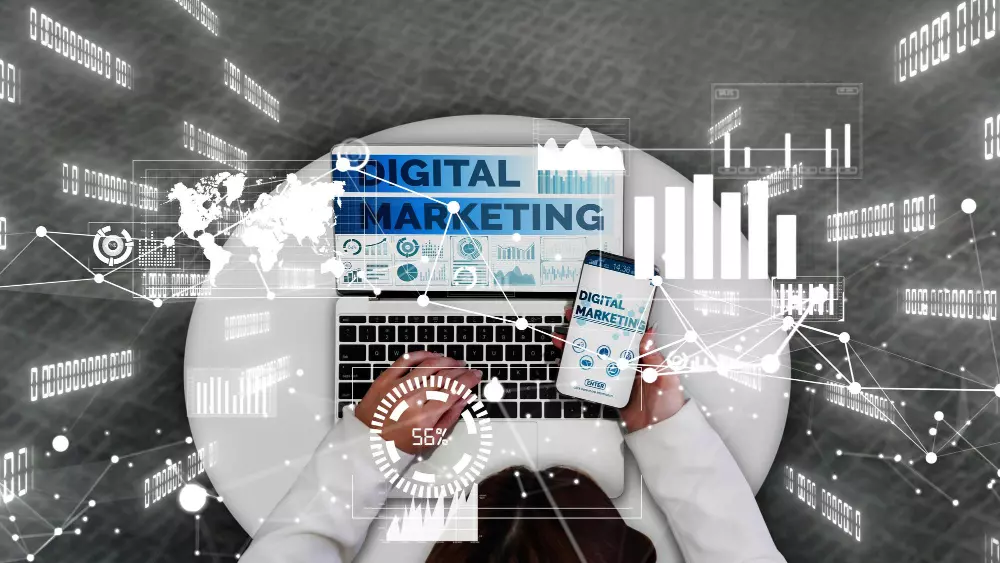With the world rapidly progressing in technology and other advancements, the future of Digital marketing is also evolving, and marketers must stay up-to-date with the latest trends and the future of digital marketing.

Top trends that can change the future of digital marketing:
- Voice Search Optimization:
- As voice search technology continues to improve, more and more people are using voice assistants like Siri, Alexa, and Google Assistant to search for information online. This means businesses must optimize their content for voice search queries to ensure it is visible to this growing audience.
- Personalization:
- Consumers expect personalized experiences from brands, and businesses are increasingly using data and artificial intelligence to deliver tailored content and messaging. This trend will continue as more companies invest in advanced personalization tools and technologies.
- Interactive Content:
- Interactive content such as quizzes, polls, and videos is becoming increasingly popular among consumers. This content engages users meaningfully with brands and provides businesses with valuable data on their audience.
- Augmented Reality:
- This is one of the promising aspects in the future of digital marketing as Augmented Reality (AR) technology is becoming more mainstream, and businesses are using it to create immersive customer experiences. From virtual try-on tools to interactive product demos, AR has the potential to revolutionize the way companies market their products.
- AI and Automation:
- With Artificial intelligence (AI) and automation transforming marketing processes, marketers use AI-powered tools for data analysis, chatbots for customer support, and personalized email marketing campaign automation. With the integration of AI, the future of digital marketing offers exciting opportunities and advancements.
- Social Commerce:
- Social media platforms are increasingly becoming e-commerce destinations, with features like shoppable posts and in-app checkout becoming more common. This trend will continue as social media platforms seek new ways to monetize their user bases.
- Video Marketing:
- The video has been a popular marketing tool for some time, but its importance is set to increase even further in the coming year. From live streaming to short-form videos, businesses are finding new and innovative ways to use video to engage their audiences.
- Influencer Marketing:
- Collaborating with influencers has become a popular strategy to reach and engage specific target audiences. Due to their active presence on Social Media, Influencers can help promote products or services, generate brand awareness, and drive conversions.
- Privacy & Data Protection:
- With privacy concerns rising, businesses must prioritize data protection and transparency in their marketing practices. This means being clear about how data is collected, stored, and used and being proactive in protecting user privacy.
Trends in marketing campaigns:
- Content Marketing:
- Interactive Content – Interactive content such as quizzes, assessments, polls, and interactive videos are gaining popularity as they enhance user engagement and provide personalized experiences.
- User-Generated Content (UGC) – Brands leverage UGC, such as customer reviews, testimonials, and social media posts, to build trust, foster authenticity, and engage their audience.
- Social Media Marketing:
- Influencer Marketing – Collaborating with influencers and micro-influencers to promote products and services has become a prevalent trend. Influencer partnerships help reach a highly targeted audience and leverage the influencer’s credibility and influence.
- Stories and Ephemeral Content – The rise of social media Stories (e.g., Instagram Stories, Facebook Stories) and ephemeral content has provided marketers with new opportunities to share timely, engaging, and temporary content with a sense of urgency. With almost 84% of the population using social media, SMM promises to be a stepping stone in the future of digital marketing.
- Video Marketing:
- Short-form Videos – Short-form videos, such as those on TikTok and Instagram Reels, have gained significant popularity. Marketers are leveraging these platforms to create engaging and shareable video content.
- Live Streaming – Live streaming video content, including webinars, interviews, product demonstrations, and behind-the-scenes footage, is being used to foster real-time audience interaction and engagement.
- Influencer Marketing:
- Nano-Influencers and Micro-Influencers – Marketers are increasingly working with nano-influencers (those with a smaller but highly engaged audience) and micro-influencers due to their authenticity, niche expertise, and stronger connections with their followers.
- Long-term Partnerships – Brands are building long-term relationships with influencers to create a more authentic and sustainable presence. Rather than one-off collaborations, ongoing partnerships help maintain consistent brand messaging.
- Search Engine Optimization (SEO):
- Voice Search Optimization – With the rise of voice assistants and smart speakers, optimizing content for voice search queries is becoming increasingly important. Marketers are adapting their SEO strategies to target conversational and long-tail keywords.
- Featured Snippets – Featured snippets are concise answers displayed at the top of search engine results pages. Optimizing content to appear in featured snippets helps increase visibility and drive organic traffic.
- Email Marketing:
- Personalization and Automation – Email marketing is becoming more personalized and automated, leveraging customer data to deliver targeted and relevant content to subscribers. Dynamic content and triggered emails based on user actions are gaining popularity.
- Interactive Emails – Marketers are incorporating interactive elements into their emails, such as GIFs, polls, and surveys, to enhance engagement and encourage user interaction.
- Mobile Marketing:
- Mobile-First Approach – Given the increasing use of mobile devices, marketers are adopting a mobile-first approach, optimizing websites, ads, and content for mobile users to deliver seamless experiences.
- Mobile Payment Solutions – Integrating mobile payment solutions, such as mobile wallets and in-app purchases, simplifies the purchasing process and improves conversion rates for mobile users.
These are just a few trends across various and the future of digital marketing campaigns. It’s important for marketers to stay updated with the latest trends, technologies, and consumer behaviors to reach and engage their target audience effectively.
Chatbots and Conversational Marketing: Enhancing Customer Engagement and Support
In today’s fast-paced digital world, businesses constantly seek innovative ways to engage and support their customers. Chatbots and conversational marketing have emerged as game-changers, transforming how brands interact with their audience.

Following are the ways to enhance your campaign using Chatbots:
The Rise of Chatbots:
- Understanding Chatbots – Explore the basics of chatbot technology and how it works. Learn about the different types of chatbots, including rule-based and AI-powered chatbots, and understand their capabilities and limitations.
- Enhancing Customer Experience – Discover how chatbots can streamline customer interactions by providing instant responses, personalized recommendations, and 24/7 support. Explore how chatbots can improve customer satisfaction and foster long-term customer relationships.
Conversational Marketing Strategies:
- Personalized Conversations – Learn how conversational marketing focuses on creating meaningful and personalized conversations with customers. Explore strategies to leverage chatbots for collecting customer data, understanding preferences, and delivering tailored marketing messages.
- Lead Generation and Qualification – Discover how chatbots can be utilized as powerful lead generation tools. Explore tactics to engage website visitors, capture leads, and qualify prospects through interactive conversational experiences.
Omnichannel Chatbot Integration:
- Seamless Customer Journeys – Understand the importance of an omnichannel approach to chatbot implementation. Explore how chatbots can be integrated across various platforms and channels, such as websites, social media, and messaging apps, to provide a seamless customer experience.
- Handoff to Human Agents – Learn how to effectively manage the transition from chatbots to human agents when complex queries or personalized assistance is required. Discover strategies for seamless handoffs that ensure a consistent and efficient customer support experience.
AI-Powered Chatbots and Natural Language Processing:
- Advanced Capabilities – Explore the capabilities of AI-powered chatbots, including natural language processing (NLP) and machine learning. Learn how these technologies enable chatbots to understand customer intent, engage in natural conversations, and provide accurate responses.
Blockchain Technology in Digital Marketing: Enhancing Transparency and Security.

Trust and security are paramount in building strong customer relationships in the digital age. Blockchain technology has emerged as a disruptive force, revolutionizing various industries, including digital marketing. Let us understand how it enhances transparency and security in digital marketing. Join us as we unravel the potential of blockchain technology and discover how it can transform your digital marketing efforts.
- Understanding Blockchain Technology:
- Blockchain Basics – Explore the fundamentals of blockchain technology, including decentralized ledgers, cryptographic algorithms, and consensus mechanisms. Understand how blockchain works and why it is considered secure and tamper-proof.
- Smart Contracts – Learn about smart contracts and self-executing agreements written on the blockchain. Discover how smart contracts automate processes, enforce transparency, and enable trustless interactions between parties.
- Enhanced Transparency in Digital Advertising:
- Ad Fraud Prevention – Discover how blockchain technology can combat ad fraud by providing transparent and auditable records of ad impressions, clicks, and conversions.
- Supply Chain Transparency – Uncover how blockchain enables transparency in the supply chain, allowing marketers to track the origin and authenticity of products. Learn how blockchain can help prevent counterfeiting and build trust with consumers.
- Data Privacy and Consent Management:
- Secure Data Sharing – Explore how blockchain can empower individuals to have control over their personal data. Learn how blockchain-based identity solutions can ensure secure and permission-based data sharing, eliminating the need for intermediaries.
- Consent Verification – Discover how blockchain can streamline consent management processes, ensuring user consent is securely recorded and easily verifiable. Explore the potential of blockchain in building trust and complying with data privacy regulations like GDPR.
- Blockchain-Powered Loyalty Programs:
- Immutable Loyalty Transactions – Learn how blockchain can transform loyalty programs by providing a secure and transparent ledger for tracking customer loyalty transactions. Discover how blockchain-based loyalty programs can enhance trust, reduce fraud, and offer real-time rewards.
Blockchain technology is revolutionizing the digital marketing landscape by enhancing transparency and security. By embracing blockchain, businesses can build trust with customers, combat fraud, and ensure data privacy.
How to stay updated with Digital Marketing trends?
- Subscribe to Industry Publications and Blogs:
- Subscribe to reputable marketing publications and blogs covering digital marketing topics. This will help you stay informed about the latest digital marketing trends, news, and insights in the industry. Some popular publications include MarketingProfs, HubSpot, Moz, and Social Media Examiner.
- Attend Webinars and Virtual Events:
- As many industry experts and organizations host webinars and virtual events to share insights and discuss current trends in digital marketing, these events often feature presentations, panel discussions, and Q&A sessions with industry leaders.
- Follow Influencers and Thought Leaders:
- Identifying influential figures and thought leaders in the digital marketing space and following them on social media platforms like LinkedIn, Twitter, and Instagram will help you gain valuable insights, industry trends, and resources that can keep you updated regarding digital marketing trends.
- Continuous Learning and Training:
- The future of digital marketing lies completely in consistent learning and application. Invest in continuous learning and professional development by enrolling in online courses, certifications, or workshops focused on digital marketing. This will keep you updated regarding digital marketing trends and improve your knowledge and skills.
- Stay Curious and Engage in Continuous Research:
- It is always beneficial to cultivate curiosity and willingness to learn and seek out new information, research, and case studies related to digital marketing. Engage in continuous research and exploration to stay ahead of the curve.
Challenges ahead in the future of digital marketing.
While the future of digital marketing holds numerous opportunities, it also presents several challenges that marketers must navigate.

Here are some of the key challenges ahead:
- Changing Consumer Behavior:
- Consumer behavior is constantly evolving, driven by factors such as technological advancements, cultural shifts, and economic changes. Marketers must stay updated with these changes and adapt their strategies accordingly.
- Privacy and Data Regulations:
- This is one of the major hurdles in the future of digital marketing since people are becoming more conscious regarding their privacy, along with stricter privacy laws like the GDPR and CCPA, due to increased cyber crimes. Data privacy and regulations will continue to pose market challenges. Marketers must ensure compliance and implement ethical data collection and usage practices while delivering personalized experiences.
- Ad Blockers:
- Ad blockers are becoming more widespread, and consumers are increasingly becoming immune to traditional advertising messages. Marketers must find creative ways to overcome ad blockers and deliver engaging, non-intrusive ads.
- Content Saturation and Information Overload:
- The digital space is inundated with content, making it increasingly difficult for marketers to capture and retain audience attention. Creating high-quality, unique, and valuable content that cuts through the noise will be essential. Marketers must focus on storytelling, personalization, and delivering relevant content to engage and connect with their target audience.
These are some of the hurdles to be crossed, but with continuous learning and adaptation, the future of digital marketing can be secured and boosted.

In conclusion, the future of digital marketing lies in continuous learning and adaptation, and by embracing emerging technologies and strategies, companies can build stronger relationships with their audiences and achieve tremendous success in their marketing efforts. Also, by implementing the system to keep yourself updated regarding digital marketing trends, you will never miss any opportunity and stay ahead of the rest. Thus from these advancements, we can say that digital marketing is the future of marketing.


